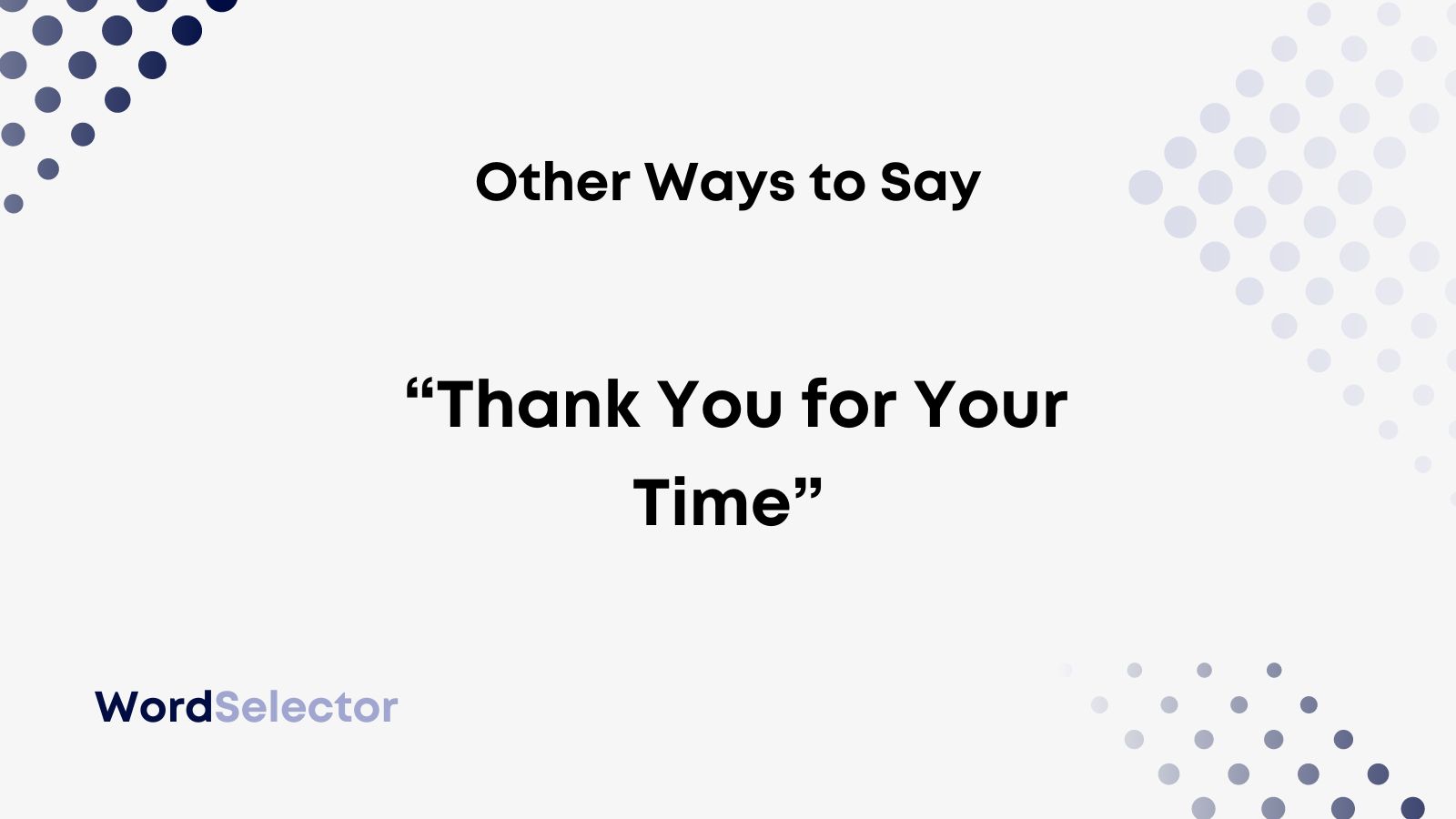So, you want to share your appreciation for someone’s time.
However, you don’t want to sound too repetitive or generic when doing so.
“Thank you for your time” might be on the tip of your tongue, but is it your only choice?
This article will answer that question for you. We’ll show you how to say “thank you for your time” in an email to keep things engaging.
Other Ways to Say “Thank You for Your Time”
- I appreciate the time you’ve given me
- Thanks for making time for me
- I’m grateful for the time you’ve spared
- Thank you for investing your time
- I’m thankful for the time you’ve shared
- Your time is greatly appreciated
- Thanks for your time and attention
- Your time means a lot to me
- Thank you for hearing me out
- I’m grateful for the time you’ve set aside
- I truly value the time you’ve given me
KEY TAKEAWAYS
- “Thank you for your time” is a great phrase to use to show appreciation for someone who might usually be busy.
- “I appreciate the time you’ve given me” is a great formal synonym to keep things interesting.
- Try “thanks for making time for me” as a more informal alternative in your emails.
Keep reading to learn how to professionally thank someone for their time. We’ll also talk you through a more informal option to cover any context that might occur.
Also, you can skip to the last section to learn if it’s correct to say “thank you for your time.” That way, you’ll know whether it’s good to include it in an email in the first place.
I Appreciate the Time You’ve Given Me (Formal)
When you want to thank someone for their time after a meeting, you can say “I appreciate the time you’ve given me.”
It’s a great formal alternative to “thank you for your time.” It’s much more respectful and gives off a more professional tone.
We recommend using it when thanking your boss. It shows you truly respect them and appreciate that they’re quite busy.
So, if your boss can take time out of their busy days to meet with you, it’s always worth thanking them.
Here’s an email sample to show you how to start a conversation with it:
Dear Mr. Mathews,
I appreciate the time you’ve given me here. Thanks for letting me talk during the meeting.
Best regards,
Jon Stevenson
Alternatively, you can use “I appreciate the time you’ve given me” after an interview.
This time, it’s more appropriate to use it when thanking a recruiter, even if you didn’t get the job.
So, you can include it at the end of an email by following this example:
Dear Miss Parker,
Although I’m saddened to hear that I didn’t get the job, I’m still thankful to hear from you.
I appreciate the time you’ve given me,
Carla Simmonds
Thanks for Making Time for Me (Informal)
Feel free to use “thanks for making time for me” as another way to say “thank you for your time.”
It works well in conversational emails, as it shows you’re happy to have received someone’s time.
We recommend including it when emailing a coworker. It shows you value them as a colleague and appreciate that they’ve taken time out of their schedules for you.
Whether you met with a colleague or simply had a catch-up chat, this is a great phrase to use! It’s always good to share your appreciation with someone after they’ve been there for you.
This email example will help you understand how to start a conversation:
Hi William,
Thanks for making time for me the other day! It was really nice to get a chance to talk to you!
All the best,
Alex Monkey
And this sample will help you if you’re still trying to figure out how to end an email with it:
Hey Melissa,
I certainly enjoyed our conversation on Friday. It was a lot to take in, but I still got the jist of it.
Thanks for making time for me,
George White
Is It Correct to Say “Thank You for Your Time”?
It is correct to say “thank your for your time.” It’s a polite and formal phrase that shows you truly appreciate that someone gave you the time and listened to what you have to say.
Generally, we encourage this when emailing an employer. It’s best to be respectful, especially if it’s your first time speaking with them.
Here’s an example showing you how to use it in an email if you still don’t know:
Dear Mr. Smith,
I appreciate you reaching out to talk me through my application. Please keep me in mind if anything else comes up.
Thank you for your time,
Andrew Woodchurch
It works both at the start of an email and as an email closing statement. We recommend using it when you know someone has taken time out of their busy schedule to help you.
Also, you can mix in these extensions to keep your writing fresh:
- Thank you for your time and consideration
- Thank you for your time thus far
- Thank you for your time and interest
These extensions allow you to be a bit more specific and considerate. They’re useful ways to let someone know just how thankful you are.

